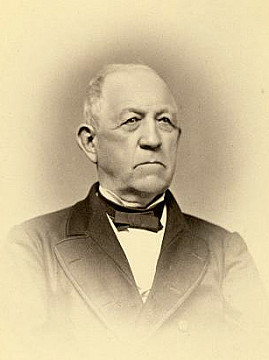John Insley Blair (1802-1899)
"Plain John I." Blair, Railroad Magnate & Philanthropist, of Blairstown, New Jersey
He was born in a log cabin on Foul Rift Road near Belvidere, New Jersey. His cousin was a merchant and at the age of eleven John started work as a clerk in his store. By 1822, he owned his own store in Gravel Hill (where he would live for the rest of his life) and soon owned a chain of stores in the area, allowing him to become a wholesale distributor. In 1830, he opened the National Bank in Belvidere which would remain instrumental to his expansion into flour and cotton production, and then land, mining and railroads. By 1839, the hamlet of Gravel Hill had grown into a town and was renamed "Blairstown" for his role in its growth. In 1846, he became a partner in the Lackawanna Coal & Iron Co., one of the earliest suppliers of steel rails to the railroad industry, and in 1852 he built the first of 30 railroads (the Delaware, Lackawanna & Western). He became President of 16-railroads and as he laid the tracks on which much of the country expanded west, he became the largest owner of rail mileage in the world.
He acquired nearly 2-million acres from the government on which he not only laid out his tracks, but also focused on developing towns along their route. He created over 80-towns and more often than not provided each one with a Presbyterian church. His philanthropy started with the creation of Blairstown Academy in 1848 into which he poured $600,000 in his lifetime and Insley Hall set the tone for its magnificent architecture - it has been called, "the most beautiful private high school in New Jersey". He was instrumental towards establishing Lafayette College in Easton, Pennsylvania, and Grinnell College, Iowa. At Princeton University, he endowed a Geology Professorship; served as a trustee from 1866; and, built Blair Hall in 1897. He amassed a fortune of $70 million, but was always known affectionately in Blairstown as "Plain John I.," where comparative to his wealth he lived modestly at The Homestead. In 1826, he married Nancy Locke and had two sons and two daughters. His elder son died young and his business' were continued by his younger son, DeWitt C. Blair. His daughter, Emma, married the publisher, Charles Scribner.
He acquired nearly 2-million acres from the government on which he not only laid out his tracks, but also focused on developing towns along their route. He created over 80-towns and more often than not provided each one with a Presbyterian church. His philanthropy started with the creation of Blairstown Academy in 1848 into which he poured $600,000 in his lifetime and Insley Hall set the tone for its magnificent architecture - it has been called, "the most beautiful private high school in New Jersey". He was instrumental towards establishing Lafayette College in Easton, Pennsylvania, and Grinnell College, Iowa. At Princeton University, he endowed a Geology Professorship; served as a trustee from 1866; and, built Blair Hall in 1897. He amassed a fortune of $70 million, but was always known affectionately in Blairstown as "Plain John I.," where comparative to his wealth he lived modestly at The Homestead. In 1826, he married Nancy Locke and had two sons and two daughters. His elder son died young and his business' were continued by his younger son, DeWitt C. Blair. His daughter, Emma, married the publisher, Charles Scribner.
Parents (2)
Children (4)
Associated Books (1)
Categories
Share
The Blair Trail, by Robert Koppenhaver; American Sculpture in the Metropolitan Museum of Art, by Lauretta Dimmick; Obituary in The New York Times, 1899






